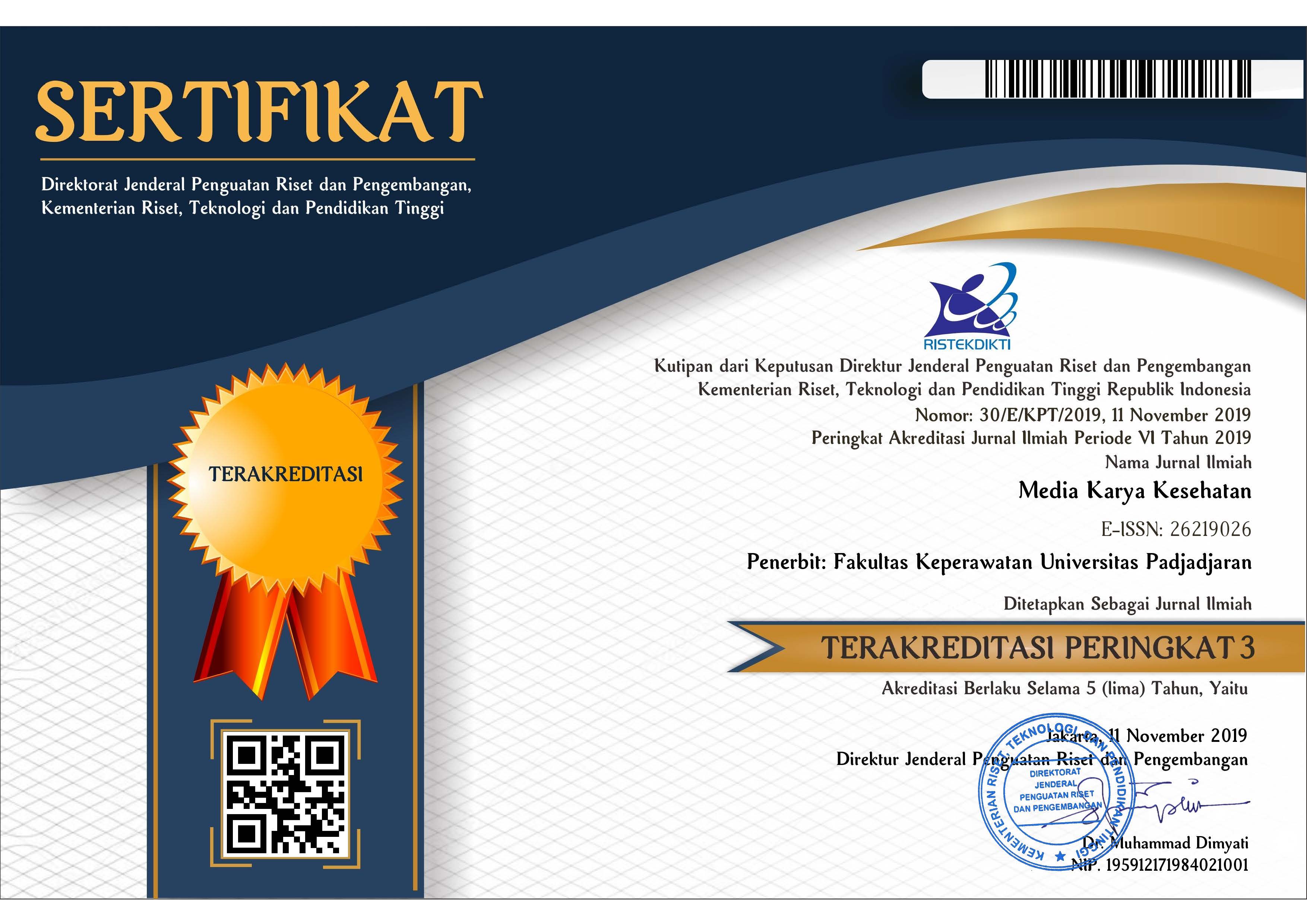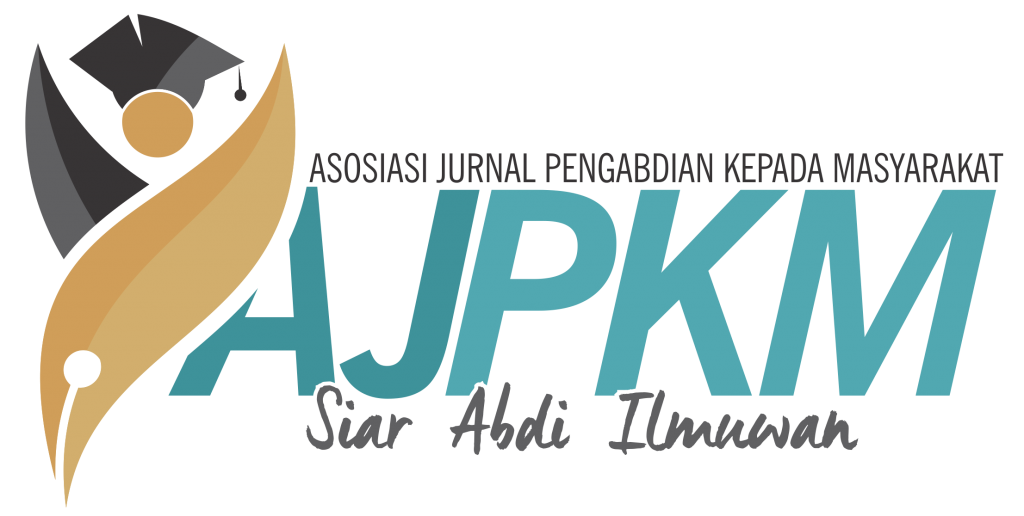Grandmother's Role as a Personal Reference toward Exclusive Breastfeeding Behavior
Abstract
Grandmother's role in the behavior of exclusive breastfeeding is very necessary because the grandmother is the closest person in the family. Its existence influences decision-making in various family matters, especially the care of children from birth to adulthood. This study aims to analyze differences in the role of grandmothers as a personal reference for exclusive breastfeeding behavior. This type of experimental Quasy research was conducted in May-July 2018 in Sidoarjo Regency, East Java, Indonesia by dividing two experimental groups, namely the treatment group and the control group. Both groups started with a pre-test, and after the treatment was measured again (post-test). Statistical analysis used multivariate covariance analysis (MANCOVA) to test whether there were differences in treatment between the control group and the treatment group after adjusting for confounding variables, namely formula milk promotion. The results of the pre-test statistical test showed that the value of p = 0.384 means that there is no difference in the role of the grandmother on the exclusive breastfeeding behavior of the control group and the treatment group. The results of the post-test statistical test showed that the value of p = 0.000 means that there are differences in the role of the grandmother on the exclusive breastfeeding behavior of the control group and the treatment group. The role of the grandmother as a personal reference can influence exclusive breastfeeding behavior so that it can be a form of family support for the mother for exclusive breastfeeding and can be used as a way to support exclusive breastfeeding mothers.
Keywords: Behavior, exclusive breastfeeding, grandmother’s role, personal reference.
Full Text:
PDFReferences
Anjani, W. . (2018). Hubungan Pemberian ASI Eksklusif dengan Kejadian Stunting pada Balita Usia 12-35 Bulan. FK Universitas Andalas.
Etika, R., & Partiwi. (2015). Breastfeeding Sick Baby. IDAI.
Friedman, E. T. ., Bowden, V. ., & Jones, E. . (2010). Buku Ajar Keperawatan Keluarga: Riset, Teori, dan Praktik ( et al Penerjemah: Achir Yani (ed.); 5th ed.). EGC.
Furi, L. T., & Megatsari, H. (2014). Faktor yang Mempengaruhi Ibu Bersalin pada Dukun Bayi dengan Pendekatan WHO. Promkes, 2(1), 77–88. https://doi.org/10.1016/S1876-2859(09)00324-6.
Grassley, J., Clark, M., Schleis, J. (2012). A Grandmother’s Tea: Evaluation of a Breastfeeding Support Intervention. The Journal of Perinatal Education, 21(2), 80–89.
Hanieh, S., Ha, T. T., Simpson, J. A., Thuy, T. T., Khuong, N. C., Thoang, D. D., Tran, T. D., Tuan, T., Fisher, J., & Biggs, B.-A. (2015). Exclusive Breast feeding in Early Infancy Reduces the Risk of Inpatient Admission for Diarrhea and Suspected Pneumonia in Rural Vietnam: a Prospective Cohort Study. BMC Public Health, 15, 1–10. https://doi.org/10.1186/s12889-015-2431-9.
Hariyani. (2014). Alasan Tidak Diberikan ASI Eksklusif oleh Ibu Bekerja di Kota Mataram NTB. In Program Pasca Sarjana Universitas Udayana Denpasar.
Hersoni, S. (2015). Pengaruh Pemberian ASI Eksklusif terhadap Kejadian Infeksi Saluran Pernapasan Akut (ISPA) pada Bayi Usia 6-12 bulan di RAB RSU dr. Soekardjo Kota Tasikmalaya. Jurnal Kesehatan Bakti Tunas Husada, 14(1), 84–90. http://ejurnal.stikes-bth.ac.id/index.php/P3M/article/viewFile/114/113.
Kemenkes. (2016). Profil Kesehatan Indonesia 2015. Pusat Data dan Informasi Kemenkes RI. https://doi.org/351.077 Ind.
Kemenkes R.I. (2014). Situasi dan Analisis ASI Eksklusif. Pusat Data Dan Informasi Kementerian Kesehatan RI, 1–7.
Kemenkes R.I. (2015). Profil Kesehatan Indonesia 2014. Kementerian Kesehatan Republik Indonesia. https://doi.org/10.1037/0022-3514.51.6.1173.
Kurniawan, B. (2013). Determinan Keberhasilan Pemberian Air Susu Ibu Eksklusif. Journal Kedokteran Brawijaya, 27(4), 236–240. http://download.portalgaruda.org/article.php?article=81372&val=4387.
Lodge, C.J, Tan, D. ., Lau, M. X. ., Dai, X., Tham, R., Lowe, A. ., Bowatte, G., Allen, K. ., & Dharmage, S. . (2015). Breastfeeding and Asthma and Allergies: a Systematic Review and Meta-analysis. Acta Paediatrica, 104, 38–53. https://doi.org/10.1111/apa.13132.
Lodge, Caroline J, Bowatte, G., Matheson, M. C., & Dharmage, S. C. (2016). The Role of Breastfeeding in Childhood Otitis Media. Current Allergy and Asthma Reports, 16(68), 1–8. https://doi.org/10.1007/s11882-016-0647-0.
Nursalam. (2016). Metodologi Penelitian Ilmu Keperawatan: Pendekatan Praktis (Edisi 3). Salemba Medika.
Roesli, U. (2005). Mengenal ASI Eksklusif. Trubus Agriwidya.
Siswono. (2014). Intervensi Kesehatan Masyarakat dalam Peningkatan Cakupan ASI Eksklusif di Wilayah Puskesmas Sindang Barang Kota Bogor. FKM UI Jakarta.
Sudiharto. (2007). Asuhan Keperawatan Keluarga dengan Pendekatan Keperawatan Transkultural. EGC.
Sukmawati, Mamuroh, L., & Nurhakim, F. (2019). Pemberdayaan Keluarga dan Kader Kesehatan dalam Pemanfaatan ASI Eksklusif. Media Karya Kesehatan, 2(1), 1–10. https://doi.org/10.24198/mkk.v2i1.19067.
Suradi, R. (2010). Indonesia Menyusui. IDAI.
W. Rambitan, R.B Purba, N. . K. (2014). Hubungan Antara Riwayat Pemberian ASI Eksklusif dengan Kejadian Stunting pada Batita. FKM Sam Ratulangi Manado.
Wahyuni, YT., Abidin, Z. (2015). Pengalaman Hidup Lansia yang Mengasuh Cucu. Jurnal Empati, 4(4), 8–14.
Wiyono, G. (2011). Merancang Penelitian Bisnis dengan Alat Analisis SPSS 17.0 & SmartPLS 2.0 (1st ed.). STIM YPKN Yogyakarta.
DOI: https://doi.org/10.24198/mkk.v4i1.31459
Refbacks
- There are currently no refbacks.
JURNAL INI TERINDEKS DI:









Penerbit :
Fakultas Keperawatan, Universitas Padjadjaran
Jalan Raya Bandung-Sumedang Km. 21 Jatinangor, Sumedang, Indonesia 45363
WA: 085317736810
Tlp. 022-7795596
Email: info.mkk.keperawatan@unpad.ac.id
Email: novita.trivita@gmail.com

This work is licensed under a Creative Commons Attribution-NonCommercial 4.0 International License



